BT1-REFERENCE-MATERIAL-PART-2
1/212
There's no tags or description
Looks like no tags are added yet.
Name | Mastery | Learn | Test | Matching | Spaced | Call with Kai |
|---|
No analytics yet
Send a link to your students to track their progress
213 Terms
Rough Hardware
Metal products used in construction meant to be concealed, such as bolts, nails, screws, spikes, and other metal fittings.
Finish Hardware
Hardware with a finished appearance and decorative function, such as hinges, locks, catches, used with doors, windows, and cabinets.

Common Wire Nail or Common Nail
A low-carbon steel nail with a slender plain shank and medium diamond point, used in framing where finish is unimportant.

Finishing Nail
A slender nail made from finer wire than the common nail, with a brad-type head for finishing work.

Brad Nail
A small finishing nail with a head almost flush with the sides or slightly projecting to one side.

Box Nail
Similar to a common nail but thinner, with a long smooth or barbed shank.

Casing Nail
A slender nail with a small, slightly flared head used for finishing work.

Ring-shank Nail
a nail having a number of ring-like grooves around the shank to increase its holding power
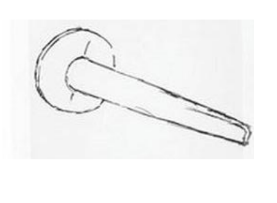
Clinch Nail
nail designed for clinching
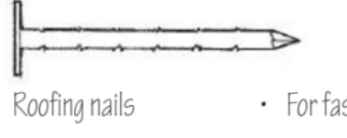
Roofing Nail
A short nail with a barbed or ring shank and a large flat head, used to secure roofing felt or shingles.
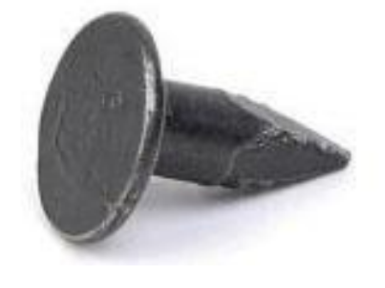
Metal Lath Nail
A nail designed for securing metal lath, used as a base for plaster.
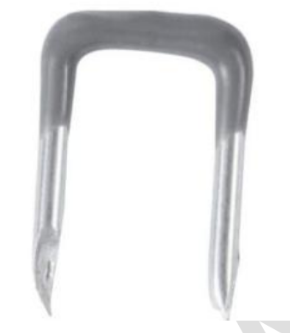
Electrician’s Staple Nail
A u-shaped metal piece with pointed ends for securing sheet material or holding a hasp.
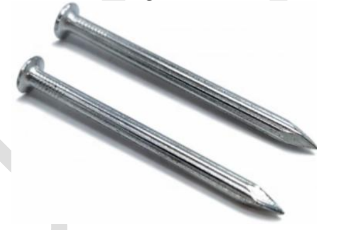
Concrete Nail
A hardened steel nail with a flat countersunk head and diamond point, used for nailing to concrete or masonry.

Masonry Nail
A hardened steel nail with a knurled or fluted shank, especially used for fastening to masonry.
Screws
externally threaded fasteners
Wood Screw
threaded metal fastener having a pointed end
Metal Screw
fastened by screwing into metal
Lag/ Coach Screw
square head and a thin coarse-pitched thread
Screw Anchors
has a metal shell with a screw along its central axis
Tekscrew
screw used to fasten metal roofing sheets to the purlins
Bolts
metallic pin having a head on one end and an external thread on the other for screwing up a nut
Nut
short metal block having a central hole which is threaded to receive a bolt

Machine Bolt
threaded bolt having a straight shank and a conventional head

Carriage Bolt
threaded bolt having a circular head
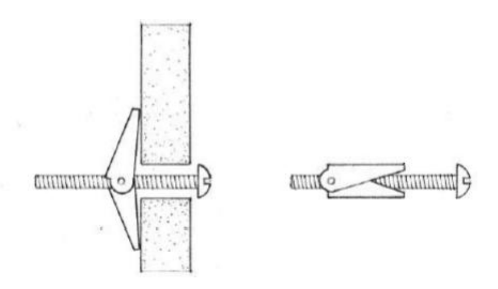
Toggle Bolt
A bolt with pivoted flanged wings that close against a spring when pushed through a hole and open after emerging from it, used to fasten objects to hollow walls or walls accessible from one side.
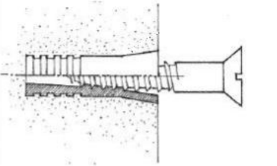
Expansion Shield
Lead or plastic sleeves inserted into a predrilled hole and expanded by driving a bolt or screw into it.
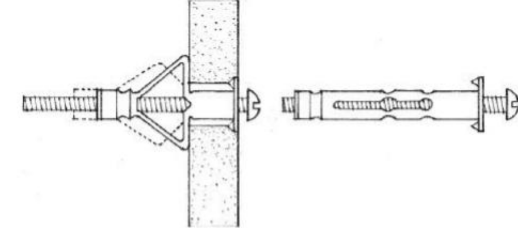
Expansion Bolts
Anchoring devices with an expandable socket that swells as a bolt is tightened into it, used in masonry walls for attaching timber.
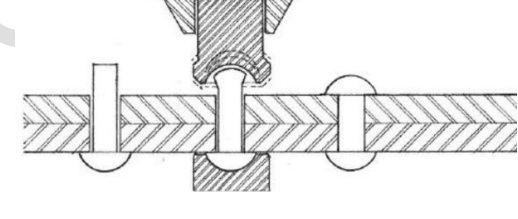
Rivets
Metal pins used for permanently joining structural steel members by passing a headed shank through a hole in each piece and hammering down the plain end to form a second head.
Hinges
Movable joints used to attach, support, and turn a door about a pivot, consisting of two plates joined by a pin to support the door and connect it to its frame.
Butt Hinge
A type of hinge attached to the butt edge of a door, consisting of two leaves with an odd number of knuckles on one leaf and an even number on the other, forming the barrel of the hinge.
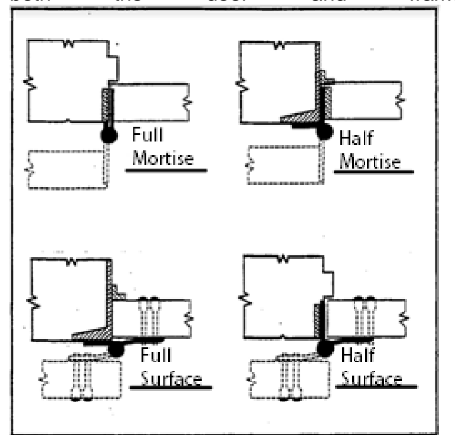
Full Mortise, Half-Surface, Half-Mortise, Full-Surface
4 basic types of butt hinges
Olive-Knuckle Hinge
A paumelle hinge with knuckles forming an oval shape.
Invisible Hinge
A hinge constructed so that no parts are exposed when the door is closed, such as the famous brand SOSS.
Spring Hinge
A hinge containing one or more springs that automatically returns the door to its closed position when opened, acting in one or both directions.
Latches and Locksets
Devices to hold a door closed and lock it, with latch sets holding the door in place and locksets having mechanisms for locking with a key or thumbturn.
Knob
handle; usually for operating a lock
Knob Rose
round disk fastened to the face of a door around a hole in the door through which the doorknob passes
Escutcheon
protective plate surrounding the keyhole of a door
Strike/ing plate
metal plate or box which is set in a doorjamb and is either pierced or recessed to receive the bolt or latch of a lock
Lip Strike
projection from the side of a strike plate which the bolt of a lock strikes first
Closers
Devices that automatically return a door to its closed position after it is opened and control the distance a door can be opened to protect the door and surrounding construction from damage.
Pivots
Provide an alternative way to hang doors where the visual appearance of hinges is objectionable or where a frameless door design may make it impossible to use hinges.
Panic Hardware
Operating hardware used for safe egress during a panic situation, including push bars, push plates, pull bars, door stops, bumpers, and astragals.
Push plates and pull bars
used to operate a door that does not require automatic latching
Door stops and bumpers
small metal fabrications with rubber bumpers
Astragals
vertical members used between double doors to seal the opening, act as a door stop
Bolts and Fasteners:
Door Bolt or Barrel Bolt
A manually operated sliding rod or bar attached to a door for locking it without a spring in the locking mechanism.
Chain Door Fastener
A device limiting the door opening to the length of the chain.
Chain Bolt
A spring bolt at the top of a door actuated by a chain.
Foot Bolt
A bolt fixed at the bottom of a door operated by foot with a spring holding it up when the door is unbolted.
Flush Bolts
Used on the inactive leaf of a pair of doors to lock the door in place, either surface mounted or mortised into the door's edge.
Automatic Door Bottoms
Devices applied to the bottom of a door to provide a seal, moving up when the door is open and down when closed.
Weather Stripping
Used along the edge and bottom of doors to provide a tight seal against water and air infiltration.
Thresholds
Used where floor materials change at a door line, where weather stripping is required, or where minor changes in floor level occur.
Furniture Hinges
Various types including butt hinges, concealed hinges, pivot hinges, T-hinges, and glass door hinges.
Butt Hinges
furniture hinges (basic type)
Concealed Hinges
“hidden” hinges
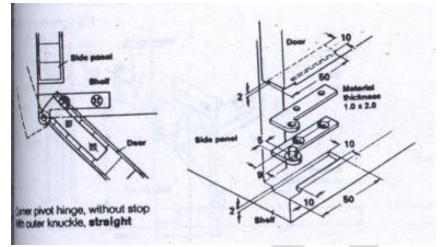
Pivot Hinges
T-hinge
surface-mounted door hinge in the shape of a letter T
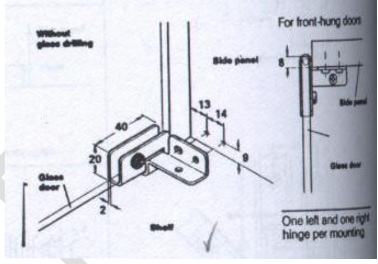
Glass door hinges
Cabinet Catches
Including friction catch, magnetic pressure catch, and bullet or ball catch.
Cabinet Knobs
Types include screw-in knob, bolt-on knob, flush knob, flush ring, and pull.
Lid Stays
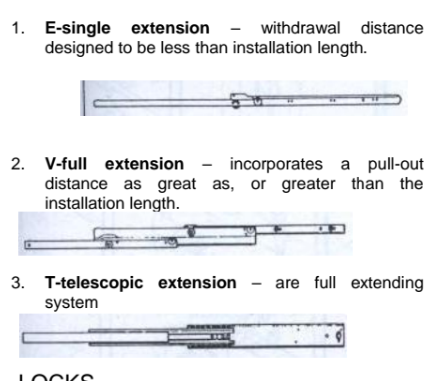
Drawer Runners
Types include E-single extension, V-full extension, and T-telescopic extension.
Locks
rim locks
mortise locks
in-laid flap locks
lever locks
glass door locks.
Shelf Supports
pin-mounted
plug-in
screw-in
screw-mounted
glass shelf supports.
Roofing Materials
Materials used to enclose a structure, prevent moisture, air, heat, and radiation transmission, and require structural framing for support.
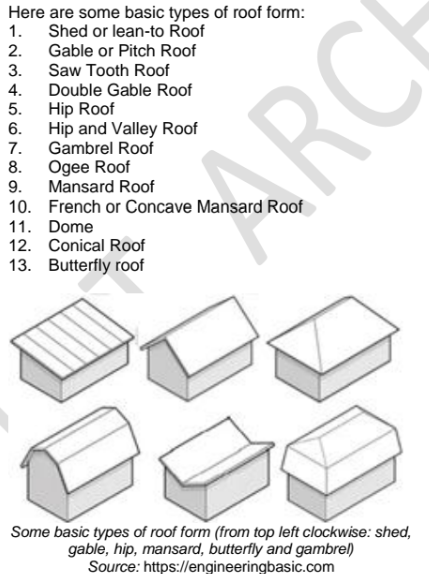
Roof Form
The shape and design of a roof determined by the type of roofing materials used and the intended appearance.
Batten
Wood or metal material used to elevate roofing material, particularly roof tiles, over undersheeting and act as anchorage.
Downspout
Conveys water from the gutter to the storm drain.
Eaves
The lower edge of a sloping roof that projects beyond the building's wall.
Fascia Board
Horizontal board nailed to the ends of roof rafters.
Flashing
Metal or impervious material to prevent water passage into a structure.
Gutter
Channel below the roof to catch and convey rainwater.
Ridge Roll
Metal sheet or tile capping the roof ridge.
Roof Beam
Structural member supporting the roof and frame.
Purlin
Horizontal support for roof covering on trusses or rafters.
Rafters
Inclined members to which the roof covering is fixed.
Truss
Structure of wood or steel members in a triangular arrangement for roof support.
Underlayment
Layer between the roof material and surface for adhesion and weatherproofing.
Undersheeting
Layer between the roof material and framing for weatherproofing and drainage.
Galvanized Iron (G.I.)
Corrugated or plain sheets used for roofing, flashing, ridge roll, and gutters.
Rib-Type
Pre-painted metal roofing with regularly spaced ribs.
Clay or Concrete Tile
Roofing material consisting of overlapping and interlocking clay or concrete units.
Roof tiles
Various types of roofing materials such as mission or Spanish tile, interlocking tiles, shingle tiles, and pantiles used to cover roofs.
Wood shingles and shakes
Roofing materials cut from water, rot, and sunlight-resistant materials like wood, treated with primer, stain, paint, or chemicals for fire resistance.
Composition shingles
Roofing materials with tabs having self-sealing adhesive, made of fiberglass or organic felt with colored mineral or ceramic granules on the weather side.
Slate roofing
Durable, fire-resistant roofing material requiring strong framing, with slate shingles split, trimmed, and drilled to receive copper nails or wire ties.
Sheet metal roofing
Metal sheets made of stainless steel, galvanized steel, copper, or zinc assembled with interlocking seams and ridges, using different seams like standing, batten, lock, and roll seams.
Gutters
Channels directing water from roofs to drains, made of materials like galvanized iron, anchored to prevent leaks, classified as exposed or concealed based on location and visibility.
Flashing
Water-resistant sheet metal installed on roof edges to prevent water leakage, operating on the principle that water must work against gravity to leak.
Strap
Metal strap or hanger used to stabilize exposed gutters, anchoring the gutter to the roof nailer or purlin.
Fastening materials
Materials like roof nails, metal screws, and rivets used to secure roofing materials to the framing, preventing leaks with sealants and rubber seals or gaskets.
Building Insulation
Any object in a building used to provide insulation for thermal, acoustic, fire, or impact purposes.
Thermal Insulation
Materials or methods used to reduce the rate of heat transfer.
Heat or Thermal Conduction
The transfer of thermal energy through matter to equalize temperature differences.
Convection
The movement of molecules within fluids.
Radiation
Energy emitted by an atom or body as it changes from a higher to a lower energy state.
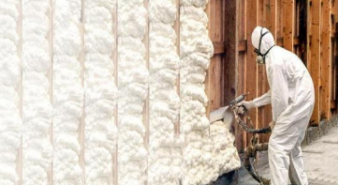
Spray Polyurethane Foam (SPF) Insulation
A two-component mixture forming expanding foam for insulation.